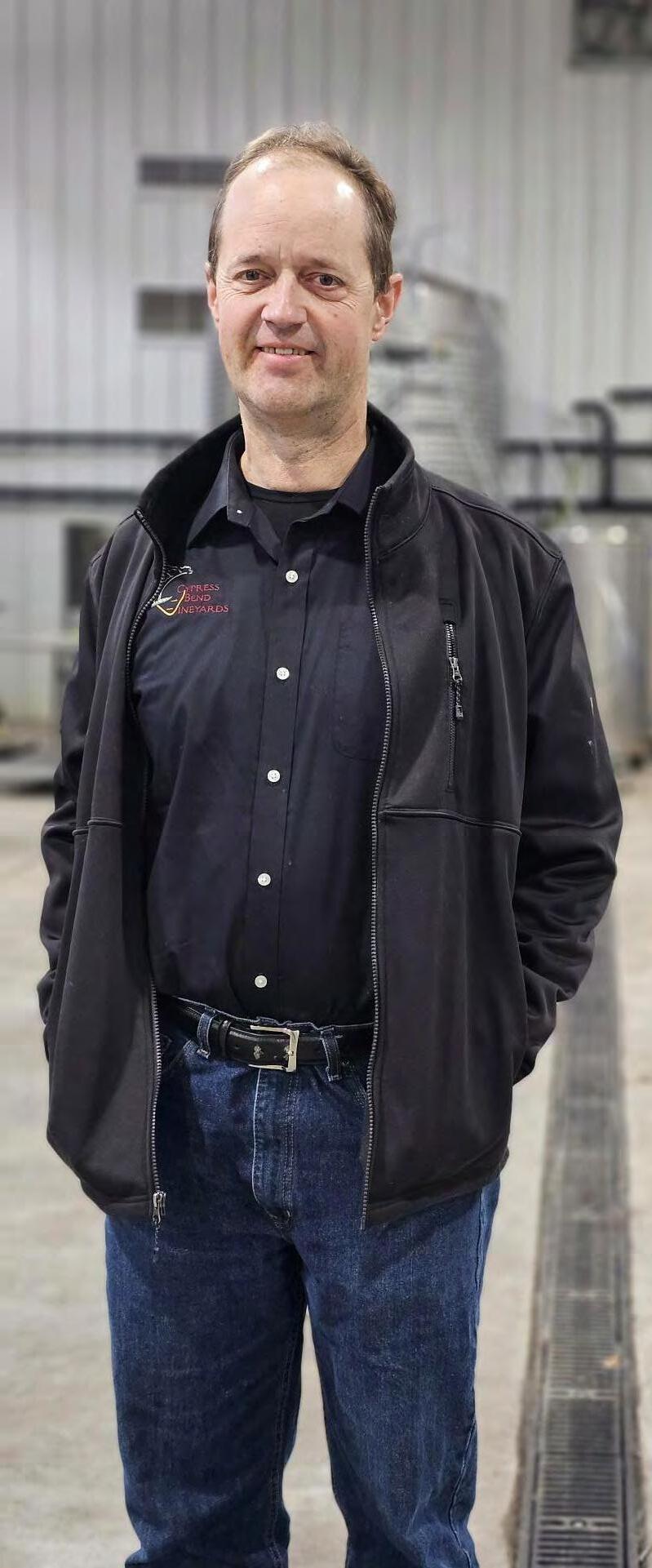
5 minute read
Winemaker Spotlight: James Radcliff
BY DATHAN KAZSUKPhoto courtesy of Cypress Bend Vineyards
Hailing from Adelaide, South Australia, the heartland of wine country, James Radcliffe grew up immersed in the rich tapestry of winemaking culture. Surrounded by the renowned McLaren Vale, Adelaide Hills and Barossa Valley wine regions, he developed a deep appreciation for the art and science of crafting fine wines.
Driven by a natural affinity for chemistry and biology, Radcliffe recognized early on that winemaking offered the perfect outlet for his talents. Fuelled by this passion and guided by a desire to merge academic pursuits with his love for wine, he embarked on a journey of discovery, enrolling in the esteemed Bachelor of Agricultural Science program at the University of Adelaide with a major in Oenology.
Fascinated by wine’s intricate flavors and complexities, he found solace in the laboratory, where he could harness his aptitude for chemistry and biology to unlock the secrets of winemaking. With each grape varietal and fermentation process, Radcliffe honed his skills, shaping a future that would intertwine his expertise with his passion for wine.
Today, Radcliffe is the newly appointed head winemaker at Cypress Bend Vineyards in Wagram, North Carolina. The winery is known for its Muscadine grapes, primarily Carlos, Noble and Magnolia, which it has crafted into various award winning wines. The winery is currently producing 16 different wines using Muscadine grapes, and with Radcliffe taking the helm, Screw it Wine decided to reach out to the winemaker and find out a little more about his background.
What made you want to be a winemaker growing up, and what were some memorable past jobs you might have had? My first job after graduation was at Rosemount Estates McLaren Vale. At the time, the Rosemount brand was experiencing very strong growth. As a result, I not only got to experience wine production, but also experience winery development and expansion.
At larger wineries, expansions always seem to occur during the grape processing period. This enabled me to learn about many of the engineering aspects of a large-scale winery.
We also made many different wine styles there. We made barrel-fermented Chardonnay, Rhone varietal red blends (GSM), Bordeaux red blends, sparkling wine bases and many other different wine varieties and styles. The red fermenter sizes ranged from 6-ton traditional open fermenters to 60-ton rotary fermenters. So, a good mix of old and new methods. Plus, we had a large barrel maturation program with a capacity of about 200,000 gallons. It was a very interesting and educational three years there.
What was your most important lesson before becoming a head winemaker at your current position? How did that help and get you where you are currently? The most important lesson in winemaking is to preserve the quality and flavor of the wine through judicious use of the sulfur dioxide in the wine, keeping the wine in full or regularly checked variable capacity tanks, and regular maintenance of the wine by tasting, checking sulfur dioxide levels and checking turbidities to ensure that there are no spoilage or oxidation issues.
Did you have a mentor in the industry when you first got your start? Who was it, and what valuable lesson did you learn from them? Merv Lange was a winery owner I enjoyed working for and with. He was the owner of Alkoomi Winery and director of Ferngrove Vineyards. I worked for both Alkoomi and Ferngrove Vineyards.
He was one the first people to plant vines in the Frankland Western Australia district in 1971. People in the area thought that he was crazy to be planting grapes. He demonstrated that good wine can be made anywhere you can grow suitable grapes. As a result, I am confident in working in areas that are not considered traditional winegrape growing areas.
What is one lesson you learned that you’d be quick to tell peers to study up on before wanting to become a winemaker? People who want to become a winemaker should understand that winemaking has many different aspects. There is the initial production of the grapes, which a winemaker needs to have some knowledge of. There is the chemistry and microbiology of the winemaking process. There is mechanical knowledge of the equipment used to process grapes and pump the juice and wine.
Later, filter the wine and equipment to bottle the wine. If the juice, grapes or bulk wine has to be transported, then you will need some understanding of logistics and trucking. Then some sales knowledge is required as well. So, a winemaker needs a good breadth of knowledge.
What is one thing you’d tell someone to sidestep in the industry? What was one lesson you learned the hard way—and know how to avoid in the future? If you want to move into the wine industry, into the industry’s production side, you need to remember that you will be working very long hours during the grape harvesting and processing period. I have observed many people find this not to be to their liking. If such hours are going to be a problem, then consider wine sales or winery accounting for steadier hours without a lot of late nights for 6 to 8 weeks of the year.
Visit Cypress Bend Vineyards at 21904 Riverton Road, Wagram, North Carolina 28396. Currently, tastings are $10 plus tax and include your choice of two full flights of wine, up to eight different wines, plus a wine glass to take home.










